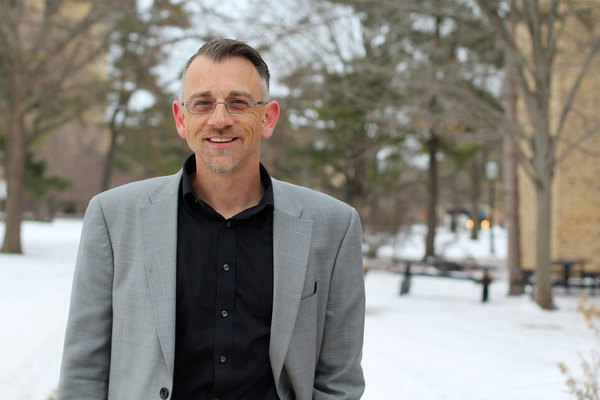The John D. and Catherine T. MacArthur Foundation today announced University of Notre Dame’s Professor Jason Rohr submitted one of the highest-scoring proposals, designated as the Top 100, in its 100&Change competition for a single $100 million grant to help solve one of the world’s most critical social challenges.
Rohr’s proposal—Disease, Food, Energy, and Water Solutions (DFEWS): Defusing a Global Crisis—offers a sustainable, local solution to reduce schistosomiasis while at the same time addressing food, energy, and water shortages afflicting marginalized populations throughout the developing world.

Schistosomiasis is a disease originating in tiny snails that feed on aquatic plants and release parasitic flatworms into the water. Villagers routinely come into contact with the parasites as they gather water, clean clothes, and bathe. Today, over 200 million people are infected with this disease, and 700 million more are at risk. These people are simultaneously experiencing shortages of food, energy, and water—over 225 million people are undernourished in Africa, 32 out of 48 African countries are in an energy crisis, and the economies of sub-Saharan Africa lose 40 billion hours per year collecting water.
To solve these problems, Rohr’s team uses validated, satellite imagery-based approaches to map where the snails live, highlighting schistosomiasis hotspots. Clearing the submerged aquatic plants effectively removes the habitat for snails that cause schistosomiasis. Not only does this process significantly increase open water access necessary for obtaining water for cooking and washing clothes, it has already resulted in a 103-fold reduction in snails and significantly decreased schistosomiasis reinfection rates among children in field trials recently conducted in Senegal. The aquatic plant biomass is turned into compost and livestock feed to enhance food supplies and used as fuel for biodigesters to increase energy production—a process that is taught to villagers to keep the solution sustainable. As a result, Rohr’s team is actively working to defuse a global crisis by simultaneously and sustainably addressing disease, food, energy, and water issues with a solution that can be scaled to other developing countries.
“My colleagues and I are so excited to be involved in work that can better the lives of some of the most disadvantaged people on the planet and do in a sustainable manner. Moreover, it is greatly satisfying to participate in research that is so consistent with the University of Notre Dame’s vision to be a healing, unifying, and enlightening force for a world deeply in need.”
The Top 100 represent the top 21 percent of competition submissions that have been rigorously evaluated against four criteria: impactful, evidence-based, feasible, and durable. The proposal was subject to MacArthur’s initial administrative review, a Peer-to-Peer review, an evaluation by an external panel of judges, and a technical review by specialists whose expertise was matched to the project.
“Jason’s inclusion in the top 100 for the MacArthur 100&Change competition is a true accomplishment and a testament to the importance of and potential impact for his research,” said Mary Galvin, William K. Warren Foundation Dean of the College of Science at the University of Notre Dame. “Getting this far is an immense achievement and our entire community is excited to witness Jason’s research progress as he works to execute Notre Dame’s mission to be a powerful means for doing good in the world.”
The MacArthur Foundation seeks to generate increased recognition, exposure, and support for the high-impact ideas designated as the Top 100. Since the inaugural competition, other funders and philanthropists have committed an additional $419 million to date to support bold solutions by 100&Change applicants. Building on the success of 100&Change, MacArthur created Lever for Change to unlock significant philanthropic capital by helping donors find and fund vetted, high-impact opportunities through the design and management of customized competitions. In conjunction, the MacArthur Foundation launched the Bold Solutions Network, featuring the University of Notre Dame as one of the Top 100 from 100&Change. The searchable online collection of submissions contains a project overview, 90-second video, and two-page factsheet for each proposal. The Bold Solutions Network was designed to provide an innovative approach to identifying the most effective, enduring solutions aligned with donors’ philanthropic goals and to help top applicants gain visibility and funding from a wide array of funders.
Jason Rohr is the Ludmilla F., Stephen J., and Robert T. Galla College Professor of Biological Sciences and affiliated faculty member with Eck Institute for Global Health and the Environmental Change Initiative.
Originally published by at science.nd.edu on February 19, 2020.